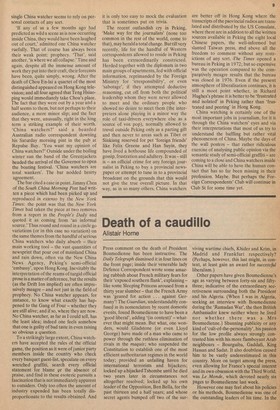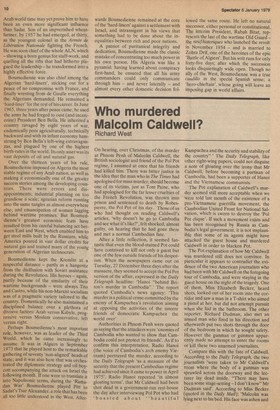Death of a caudillo
Alistair Home
Press comment on the death of President Boumedienne has been instructive. The Daily Telegraph dismissed it in four lines on the front page; inside their venerable lady Defence Correspondent wrote some amazing rubbish about French military fears for their 'exposed southern flank', explaining — like some Sleeping Princess aroused from a thirty year slumber — that the French Army was 'geared for action . . . against Germany'! The Guardian, understandably confused in its nomenclature by recent domestic events, found Boumedienne to have been a 'good liberal', adding '(in context)' — whatever that might mean. But what, one wonders, would Gladstone (or even Lloyd George) have made of a man who came to power through the ruthless elimination of rivals in the maquis; who suspended the Constitution to establish one of the most efficient authoritarian regimes in the world today; provided an unfailing haven for international terrorists and hijackers; locked up a hijacked Tshombe until he died two years later in circumstances not altogether resolved; locked up his own leader of the Opposition, Ben Bella, for the past thirteen and a half years; and whose secret agents bumped off two of the sur viving wartime chiefs, Khider and Krim, in Madrid and Frankfurt respectively? (Perhaps, however, this last might, in context, at least gain an award for successful liberalism.) Other papers have given Boumedienne's age as varying between forty-six and fiftythree; indicative of the extraordinary secretiveness surrounding both the President and his Algeria. (When I was in Algeria, seeking an interview with Boumedienne during the 'Ramadan War', the then British Ambassador knew neither where he lived nor whether there was a Mrs Boumedienne.) Shunning publicity or any kind of 'cult-of-the-personality', his passion for the low profile always strongly contrasted him with his more flamboyant Arab neighbours — Bourguiba, Gaddafi, King Hassan and Sadat. It also doubtless caused him to be vastly underestimated in this country. More on target among the press, even allowing for France's special interest and its own obsession with the Third World, was Le Monde, which devoted nearly six pages to Boumedienne last week.
However one may feel about his policies or his methods, Boumedienne was one of the outstanding leaders of his time. In the Arab world time may yet prove him to have been an even more significant influence than Sadat. Son of an impverished wheat farmer, by 1957 he had emerged, at thirty, as the youngest colonel in the Armee de Liberation Nationale fighting the French.
He was soon chief of the whole ALN, which — showing a born genius for staff-work, and quelling all the rifts that had hitherto plagued the leadership — he transformed into a highly effective force.
Boumedienne was also chief among the Algerian 'hard-liners', sticking out for a peace of no compromise with France, and finally wresting from de Gaulle everything the Algerians demanded. He remained a 'hard-liner' for the rest of his career. In June 1965, three years after peace came, he used the army he had forged to oust (and incarcerate) President Ben Bella. He inherited a country ravaged by eight years of war, endemically poor agriculturally, technically backward and with its infant economy hamstrung by Ben Bella's left-wing extravaganzas, and plagued by one of the highest birth-rates in the world. Its only asset was its vast deposits of oil and natural gas.
Over the thirteen years of his rule, Boumedienne imposed on Algeria the most stable regime of any Arab nation, as well as making it economically one of the greater success stories among the developing countries. There were errors and disappointments; industrial planning on too grandiose a scale; agrarian reform running into the same tangles as almost everywhere else; and emancipation of women lagging behind wartime promises. But Boumeddienne's greatest economic feats have resulted from his careful balancing act between East and West, which enabled him to get steel mills built by the Russians, while America poured in vast dollar credits for natural gas and trained many of the young generation of Algerian technocrats.
Boumedienne kept the Kremlin at a respectful distance — partly as a hangover from the disillusion with Soviet assistance during the Revolution. His heroes — again, partly because of the similarity of their wartime backgrounds — were always Tito and Castro, while his non-Marxist socialism was of a pragmatic variety tailored to the country. Domestically he also maintained a disciplined balance over a plethora of divisive factors: Arab versus Kabyle, progressive versus Moslem conservative, left versus right.
Perhaps Boumedienne's most important role, however, was as leader of the Third World, which he came increasingly to assume. It was in Algiers in September 1973 that he played host to the remarkable gathering of seventy `non-aligned' heads of state; and it was also here that was orchestrated the diplomatic strategy and oil boycott accompanying the attack on Israel the following month. If one were to translate it into Napoleonic terms, during the 'Ramadan War' Boumedienne played Pitt to Sadat's Tsar Alexander, a role that has been all too little understood in the West. After wards Boumedienne remained at the core of the `hard-liners' against a settlement with Israel, and intransigent in his views that something had to be done about the inequalities between rich and poor nations.
A patriot of puritanical integrity and dedication, Boumedienne made the classic mistake of concentrating too much power in his own person. His Algeria was like a pyramid: having learned about conspiracy first-hand, he ensured that all his army commanders could only communicate through him — and never laterally — and almost every other domestic decision fol lowed the same route. He left no natural successor, either personal or constitutional. The interim President, Rabah Bitat, represents the last of the wartime Old Guard — the neuflhistoriques who launched the revolt in November 1954 — and is married to Zohra Drif, one of the heroines of the epic 'Battle of Algiers'. But his writ runs for only forty-five days; after which the succession looks disquietingly wide open. Though no ally of the West, Boumedienne was a true caudillo in the special Spanish sense; a 'hero-chieftain', whose going will leave an imposing gap in world affairs.































 Previous page
Previous page